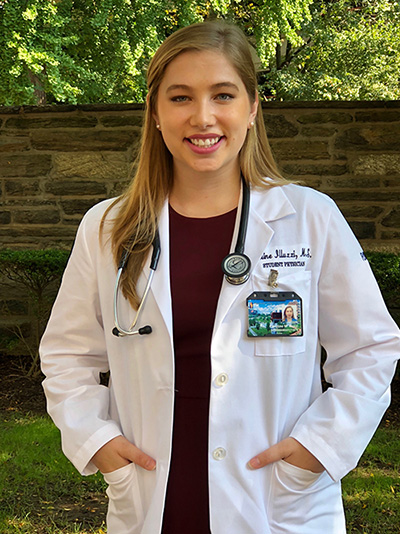
Background
Hometown: Bedminster, NJ
Undergraduate: Elon University, BS in Biology
Graduate: Drexel University College of Medicine, MS in Biomedical Studies
Medical School: Philadelphia College of Osteopathic Medicine, Class of 2022
Q&A
Can you tell me about yourself before you came to Drexel?
I graduated from Elon University in 2015 and returned home to take additional science courses at a local community college. In that time, I also worked and studied for the MCAT.
Did you always want to be a doctor?
I knew that I wanted to be a doctor since high school. Growing up on a working family sheep farm, I was introduced to medicine, in the form of veterinary medicine, at a very early age. While I loved learning about veterinary medicine through raising our animals and the added challenges of treating what one could call a “non-compliant” patient, veterinary medicine did not excite me in the same way it did my peers in 4-H. I always felt that something was missing. Over time, I realized I wanted to verbally communicate with patients and integrate components like language and culture into their care, which eventually lead me to being interested in a career as a physician.
Why did you apply to Drexel’s Biomedical Studies (MBS) program?
After taking post-baccalaureate courses, I wanted to continue to challenge myself academically and further prepare for the rigor of medical school by taking graduate level coursework. I applied to many programs and ultimately chose Drexel’s MBS program because it was extremely comprehensive. The program is designed to help students strengthen their GPA while taking graduate level coursework, increase their MCAT score, and also allows for volunteering and research opportunities. I knew that improving any of these medical school application components would make me a better candidate.
What was your relationship with the faculty like?
I had a very positive relationship with the MBS faculty. They worked to present lecture information in different ways, understanding that students have different learning styles. I believe that questions from students in lectures were always explained thoroughly, and the professors spent extra time to explain difficult subjects. The professors were also very willing to help students, holding regular weekly office hours as well as meeting by appointment so that students truly understood the subject material. I was very fortunate to have developed a close relationship with Dr. Jost, who I continue to think of as one of my mentors. I attribute much of my success in the program and throughout the application process to her support and guidance.
What was your relationship with your classmates like?
My relationship with my classmates was very collaborative and supportive. The MBS program is small, and students were able to share in the fact that we were all working toward the same goal. I found that group studying was vital for success, where classmates and I challenged each other and focused more on application of class material, to prepare for higher order exam questions as well as making clinical correlations. My classmates were also an incredibly diverse group from whom I was able to learn about other cultures, which I believe has helped me become a more culturally competent medical student.
Were you involved with any extracurricular activities or volunteering while you were here?
While in the first year of the MBS program, I volunteered weekly at the Salvation Army in Center City, Philadelphia. Mainly interacting with the children in the shelter, I assisted with different art activities. This experience helped me to better understand how individuals are affected by their access to health care and reminded me of the importance of preventative medicine.
Were you involved with any research while you were here?
I performed a short research project in the College of Medicine’s Department of Microbiology and Immunology which focused on mutations in methionine synthase genes to explore Vibrio cholerae’s use of corrinoids in support of its metabolism and associated remodeling pathways. The experience helped me to learn and practice sterile techniques and see the importance between bench top research and clinical medicine.
Do you feel that the program helped you get into and prepare for medical school?
My choice to enroll in the MBS program was one of the best academic and professional decisions I have made. The program improved and strengthened all aspects of my medical school application, including GPA, rigor of courses, MCAT, research and volunteering, and was instrumental in my acceptance to medical school. Even more so, the second year courses prepared me extremely well for the level of difficulty and pace seen in my current medical school courses. In particular, my knowledge from the MBS biochemistry, microanatomy and physiology courses has helped me immensely in my associated medical school courses. I associate much of the success I have had in medical school with having seen the information presented previously while at Drexel.
Would you recommend the MBS program to other students?
I would and have already recommended the MBS program to other students. The unique aspect of the MBS program is that it does not focus solely on improving one aspect of one’s medical school application, such as grades. The program is comprehensive and designed to improve all aspects of one’s application, and it also provides application support. The application counselor is beyond knowledgeable and helpful in assisting with writing your personal statement, deciding on which schools to apply to, and will even do mock interviews with you to ensure that you are a prepared candidate.
What advice do you have for students who are considering applying to this program?
My advice to prospective students is to understand that while the MBS program is difficult, it is completely doable. It will help you achieve your goals and be accepted to medical school. Use all of the resources to your advantage whether they be professor office hours, tutoring or the application counselor, and quite simply, work hard.